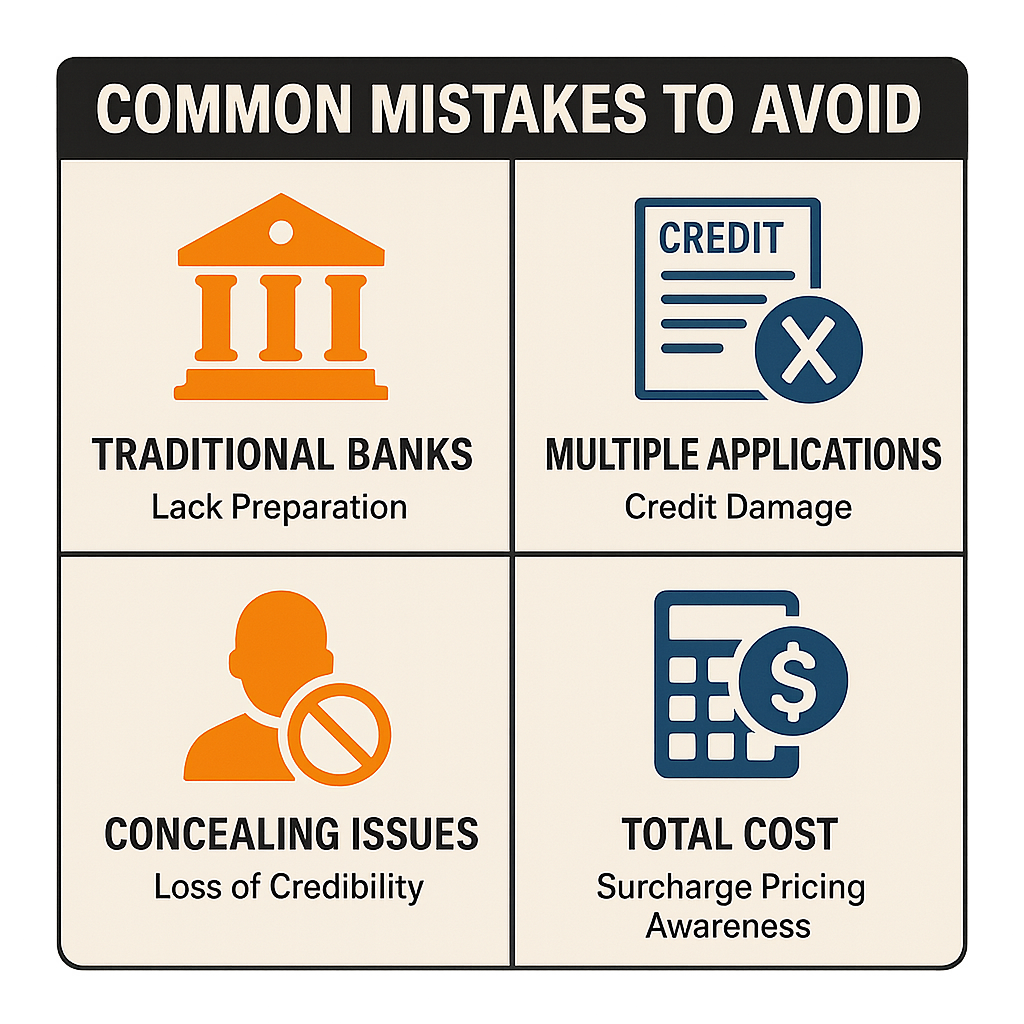Having bad credit doesn't mean your business dreams are over. While traditional banks typically require credit scores of 650 or higher, alternative funding options exist specifically for businesses with challenging credit histories. Understanding these options can be the difference between closing your doors and securing the capital needed to grow your business.
What You Should Do When Seeking Bad Credit Business Funding
When you're searching for funding for businesses with bad credit, following the right approach significantly increases your approval chances. These strategic actions will position your business favorably with alternative lenders who specialize in low credit financing.
- Explore alternative lenders first - These lenders often accept credit scores as low as 500, unlike traditional banks that require 650 or higher
- Research no-credit-check loan options - Companies like PayPal Working Capital and Square offer financing based on your business performance rather than credit history
- Prepare detailed financial documentation - Strong cash flow records can offset poor credit scores when lenders evaluate your application
- Consider revenue-based financing - This option focuses on your daily sales rather than your credit score, making it ideal for businesses with steady income
- Be transparent about your credit situation - Honesty about past financial challenges builds trust with lenders who specialize in credit score flexibility
Common Mistakes to Avoid When Applied for Bad Credit Funding

Understanding what not to do is equally important when seeking funding for businesses with bad credit. These common pitfalls can derail your funding attempts and potentially damage your chances with future lenders.
- Don't apply to traditional banks without preparation - Most require credit scores above 650 and will likely reject applications from businesses with poor credit
- Avoid applying to multiple lenders simultaneously - This creates hard inquiries that can further damage your credit score and signal desperation to potential lenders
- Never hide your credit issues - Attempting to conceal bad credit will be discovered during underwriting and destroys credibility with alternative lenders
- Don't ignore the total cost of capital - Some bad credit funding options use surcharge pricing, so calculate the true cost before accepting any offer
- Avoid rushing into the first offer - Take time to compare terms from multiple alternative lenders to ensure you're getting the best deal possible
Alternative Lenders Offer More Flexible Credit Requirements
The landscape of business financing has evolved dramatically, with alternative lenders stepping in to serve businesses that traditional banks won't approve. These lenders understand that credit scores don't tell the complete story of a business's potential. They evaluate applications based on multiple factors including daily sales, cash flow patterns, and business performance metrics rather than relying solely on personal credit scores.
Many alternative lenders have minimum credit score requirements significantly lower than traditional banks. While conventional lenders typically require scores of 650 or higher, alternative funding sources may approve businesses with scores as low as 500. This credit score flexibility opens doors for entrepreneurs who have faced financial challenges but operate viable businesses with strong revenue streams.
Rebuilding Credit Through Strategic Funding Decisions
Securing funding for businesses with bad credit isn't just about immediate capital needs, it's also an opportunity to begin rebuilding credit for future financing needs. Some alternative lenders report positive payment history to business credit bureaus, which can gradually improve your credit profile over time.
When evaluating funding options, consider how each choice impacts your long-term financial health. Revenue-based financing and merchant cash advances typically don't report to credit bureaus, which means they won't hurt your score but won't help rebuild it either. However, some alternative business loan products do report positive payment history, creating a pathway for rebuilding credit while accessing needed capital for business operations and growth.
Bad credit doesn't have to be a permanent barrier to business funding. Alternative lenders provide viable options for businesses that traditional banks reject, often with faster approval processes and more flexible requirements. Focus on lenders who understand your situation, prepare thorough documentation, and view each funding decision as a step toward rebuilding your financial future.

.png)

.svg)





